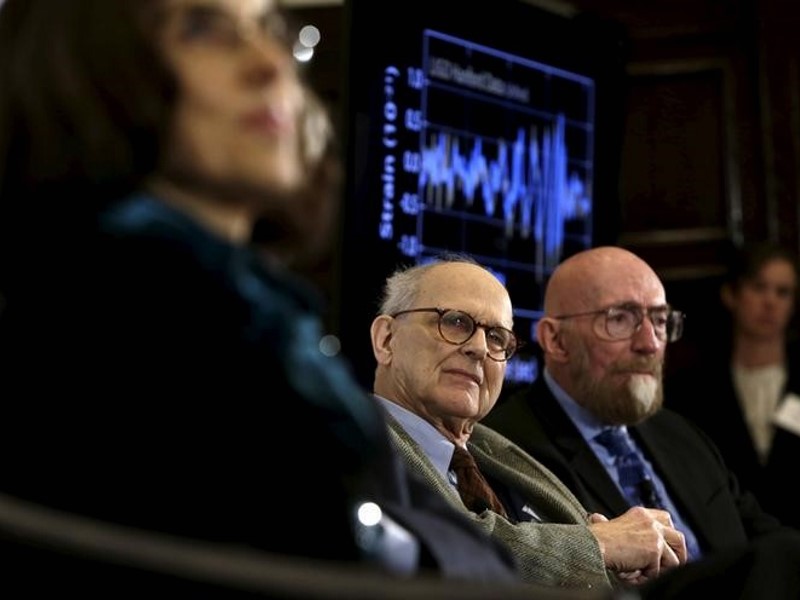- Home
- Science
- Science News
- Scientists Win $3 Million for Detecting Einstein's Waves
Scientists Win $3 Million for Detecting Einstein's Waves

Researchers who helped detect gravitational waves for the first time, confirming part of Albert Einstein's theory in a landmark moment in scientific history, will share a $3 million (roughly Rs. 20 crores) Special Breakthrough Prize, according to the prize's selection committee.
The Breakthrough Prizes for scientific achievements were created by Russian billionaire Yuri Milner along with several technology pioneers, including Facebook founder Mark Zuckerberg and Google co-founder Sergey Brin.
In February, a team from the Laser Interferometer Gravitational-Wave Observatory (LIGO) announced a pair of giant laser detectors had measured the tiny ripples in space and time first theorized by Einstein a century ago, capping a decades-long quest.
Einstein predicted gravitational waves as part of his seminal theory of general relativity, which explained gravity as distortions in both space and time caused by bodies of matter.
LIGO's three founders - Rainer Weiss, Kip Thorne and Ronald Drever, who dedicated much of their careers to gravitational wave detection - will share $1 million. More than 1,000 contributors to the project will also split $2 million equally.
"That's much more modern and much more the way that physics gets done," said Weiss, a professor emeritus at the Massachusetts Institute of Technology, of the decision to honor the entire team. "You can't credit just the three of us for this."
Researchers said the gravitational waves came from the collision of two black holes, the extraordinarily dense objects that Einstein's theory also predicted. The black holes, both many times the mass of the sun, were located 1.3 billion light years from Earth.
(Also see: What Are Gravitational Waves, and Why Should You Care?)
The waves should unlock new ways to understand the cosmos, including black holes, neutron stars and the mysteries of the early universe.
"For us to spend basically a half-century since the three of us started working in this field, to have it actually be pulled off successfully in the manner we dreamed - it was really remarkable and wonderful," said Thorne, who is retired from the California Institute of Technology. "I'm forever grateful to the team that got it done."
The winners will be honored at a December ceremony, when the regular annual awards for physics, life sciences and mathematics will also be announced. The Special Breakthrough Prize can be conferred at any time to mark "an extraordinary scientific achievement."
Edward Witten, a prominent physicist who heads the physics prize selection committee, said the discovery's magnitude warranted immediate recognition.
"There are a lot of basic things about Einstein's theory of relativity that seemed like science fiction when I was a student," Witten said. "This is the first time we've seen the full force of Einstein's theory of gravity at work."
© Thomson Reuters 2016
Get your daily dose of tech news, reviews, and insights, in under 80 characters on Gadgets 360 Turbo. Connect with fellow tech lovers on our Forum. Follow us on X, Facebook, WhatsApp, Threads and Google News for instant updates. Catch all the action on our YouTube channel.
Related Stories
- Samsung Galaxy Unpacked 2025
- ChatGPT
- Redmi Note 14 Pro+
- iPhone 16
- Apple Vision Pro
- Oneplus 12
- OnePlus Nord CE 3 Lite 5G
- iPhone 13
- Xiaomi 14 Pro
- Oppo Find N3
- Tecno Spark Go (2023)
- Realme V30
- Best Phones Under 25000
- Samsung Galaxy S24 Series
- Cryptocurrency
- iQoo 12
- Samsung Galaxy S24 Ultra
- Giottus
- Samsung Galaxy Z Flip 5
- Apple 'Scary Fast'
- Housefull 5
- GoPro Hero 12 Black Review
- Invincible Season 2
- JioGlass
- HD Ready TV
- Laptop Under 50000
- Smartwatch Under 10000
- Latest Mobile Phones
- Compare Phones
- OPPO A6v 5G
- OPPO A6i+ 5G
- Realme 16 5G
- Redmi Turbo 5
- Redmi Turbo 5 Max
- Moto G77
- Moto G67
- Realme P4 Power 5G
- HP HyperX Omen 15
- Acer Chromebook 311 (2026)
- Lenovo Idea Tab Plus
- Realme Pad 3
- HMD Watch P1
- HMD Watch X1
- Haier H5E Series
- Acerpure Nitro Z Series 100-inch QLED TV
- Asus ROG Ally
- Nintendo Switch Lite
- Haier 1.6 Ton 5 Star Inverter Split AC (HSU19G-MZAID5BN-INV)
- Haier 1.6 Ton 5 Star Inverter Split AC (HSU19G-MZAIM5BN-INV)

















